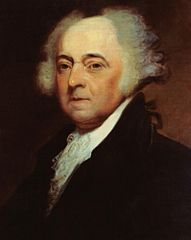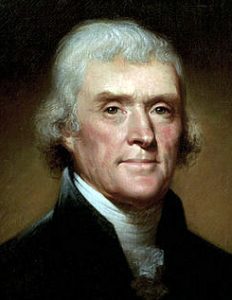 When writing to Thomas Jefferson on June 28, 1813, John Adams discusses the fact that America achieved independence through the general principles of Christianity. The letter itself, however, was the culmination of events which began nearly fifteen years earlier.
When writing to Thomas Jefferson on June 28, 1813, John Adams discusses the fact that America achieved independence through the general principles of Christianity. The letter itself, however, was the culmination of events which began nearly fifteen years earlier.
Adams and Jefferson were friends for many years but fell out after the events of the presidential election of 1800. By the year 1813 Jefferson and Adams had resumed their friendship after the repeated urgings of Dr. Benjamin Rush.1 This newly revived friendliness, however, was significantly tested when private letters written by Jefferson to Dr. Joseph Priestly were published in the biography of Rev. Theophilus Lindsey. One of the letters from 18012 included apparent and harsh censures of Adams’ policies. Upon readings this book Adams wrote to Jefferson on May 29, 1813, saying, “I wish to know if you have seen this book. I have much to say on the subject.”3
 After waiting for twelve days without a response, Adams again took up his pen on June 10, 1813, and went through the 1801 Jefferson letter responding to the various claims made against him. Adams focused on the part where Jefferson had quoted him, writing: “The President himself declaring that we were never to expect to go beyond them in real science.”4 In the original letter to Rev. Priestly, Jefferson explains his disgust at this alleged statement by the then President Adams, exclaiming:
After waiting for twelve days without a response, Adams again took up his pen on June 10, 1813, and went through the 1801 Jefferson letter responding to the various claims made against him. Adams focused on the part where Jefferson had quoted him, writing: “The President himself declaring that we were never to expect to go beyond them in real science.”4 In the original letter to Rev. Priestly, Jefferson explains his disgust at this alleged statement by the then President Adams, exclaiming:
Those who live by mystery & charlantanerie, fearing you would render them useless by simplifying the Christian philosophy, – the most sublime & benevolent, but most perverted system that ever shone on man, – endeavored to crush your well-earnt & well-deserved fame.”5
Responding to these now twelve year old charges, Adams declared:
The sentiment that you have attributed to me in your letter to Dr. Priestley, I totally disclaim, and demand, in the French sense of the word, of you the proof. It is totally incongruous to every principle of my mind and every sentiment of my heart.6
Four days later Adams wrote another letter to Jefferson continuing the project of rebuffing Jefferson’s claims from 1801, but this time focusing mainly on the “alien law.”7
On June 15, 1813, Jefferson responded to the initial letter from May 29. The existence of the biography and even the person of Theophilus Lindsey was entirely new information to him. After looking back upon his own copies of the letters sent to the Dr. Priestly, Jefferson began explaining these letters. He told Adams that, “it was a confidential communication of reflections on these from one friend to another, deposited in his bosom, and never meant to trouble the public mind.”8 He further explained:
Still less must they [readers of the letters in question] consider it as looking personally towards you. You happen, indeed, to be quoted, because you happened to express more pithily than had been done by themselves, one of the mottos of the party. This was in your answer to the address of the young men of Philadelphia.9
At the end of the letter Jefferson makes clear that he sees no need to drag up things from so long ago remarking: “I should see with reluctance the passions of that day rekindled in this, while so many of the actors are living, and all are too near the scene not to participate in sympathies with them. About the facts you and I cannot differ; because truth is our mutual guide.”10
Upon receiving Jefferson’s letter, Adams retrieved his response to the address of the young men of Philadelphia from 1798, fifteen years prior.11 Adams then proceeded to correct Jefferson’s misconception of what had been said. The young men of Philadelphia had addressed Adams during the time when hostilities with France where high, assuring the President that they were, “accentuated by the same principles on which our forefathers achieved their independence.”12 In answer to this Adams admonished them to hold fast to those fundamental principles:
Science and morals are the great pillars on which this country has been raised to its current population, opulence, and prosperity. Without wishing to damp the ardor of curiosity, or influence the freedom of inquiry, I will haphazard a prediction, that after the most industrious and impartial researches, the longest liver of you all will find no principles, institutions, or systems of education more fit, in general, to be transmitted to your posterity than those you have received from your ancestors.13
It was from this statement that Jefferson had drawn the criticism that Adams thought no improvement could be made upon the sciences of the ancestors, thereby implying that he was one of those who preferred “mystery and charlantanerie” over the simplicity of Christianity. Perceiving Jefferson’s misunderstanding, Adams described the principles which he referred to in his 1798 letter. He began by walking through what his answer did not mean:
Could my answer be understood by any candid reader or hearer, to recommend to all the others the general principles, institutions, or systems of education of the Roman Catholics, of those of the Quakers, or those of the Presbyterians, or those of the Philosophers? No.14
Adams here dismissed any idea that he attempted to propagate and employ for personal power a “most perverted system” of values instead of that “most sublime and benevolent” form of Christianity. Carrying on, Adams revealed what he truly meant, saying:
The general principles in which the fathers achieved independence, were the only principles on which that beautiful assembly of young men could unite, and these principles only could be intended by them in their address, or by me in my answer. And what were these general principles? I answer, the general principles of Christianity, in which all those sects were united, and the general principles of English and American liberty…15
Adams explained to Jefferson that in actuality they both desired the same ends – that the simplicity of those general principles of the Christian faith be maintained by the younger generation just as it had been by their own.
Endnotes
1 Cf. https://wallbuilders.com/resource/benjamin-rush-dream-about-john-adams-and-thomas-jefferson/
2 Thomas Jefferson to Doctor Joseph Priestly, March 21, 1801, The Works of Thomas Jefferson, ed. Paul Ford (New York: G. P. Putnam’s Sons, 1905), IX:216.
3 John Adams to Thomas Jefferson, May 29, 1813, Founders Archives.
4 John Adams, The Works of John Adams, ed. Charles Francis Adams (Boston: Little, Brown and Company, 1856), X:40.
5 Jefferson, Works of Jefferson, IX:217.
6 Adams, Works of Adams, X:41.
7 Adams, Works of Adams, X:42.
8 Jefferson, Works of Jefferson, XI:294.
9 Jefferson, Works of Jefferson, XI:294.
10 Jefferson, Works of Jefferson, IX:296.
11 Adams, Works of Adams, IX:187.
12 Adams, Works of Adams, X:44.
13 Adams, Works of Adams, X:44.
14 Adams, Works of Adams, X:45.
15 Adams, Works of Adams, X:45.
Still looking for answers? Visit our FAQ page
More Resources
Know the Truth and Protect Your Freedoms.
Still looking for answers? Visit our FAQ page
Stay Informed with the Latest Resources
Enter your email address to receive our regular newsletter, with important information and updates right in your inbox!










